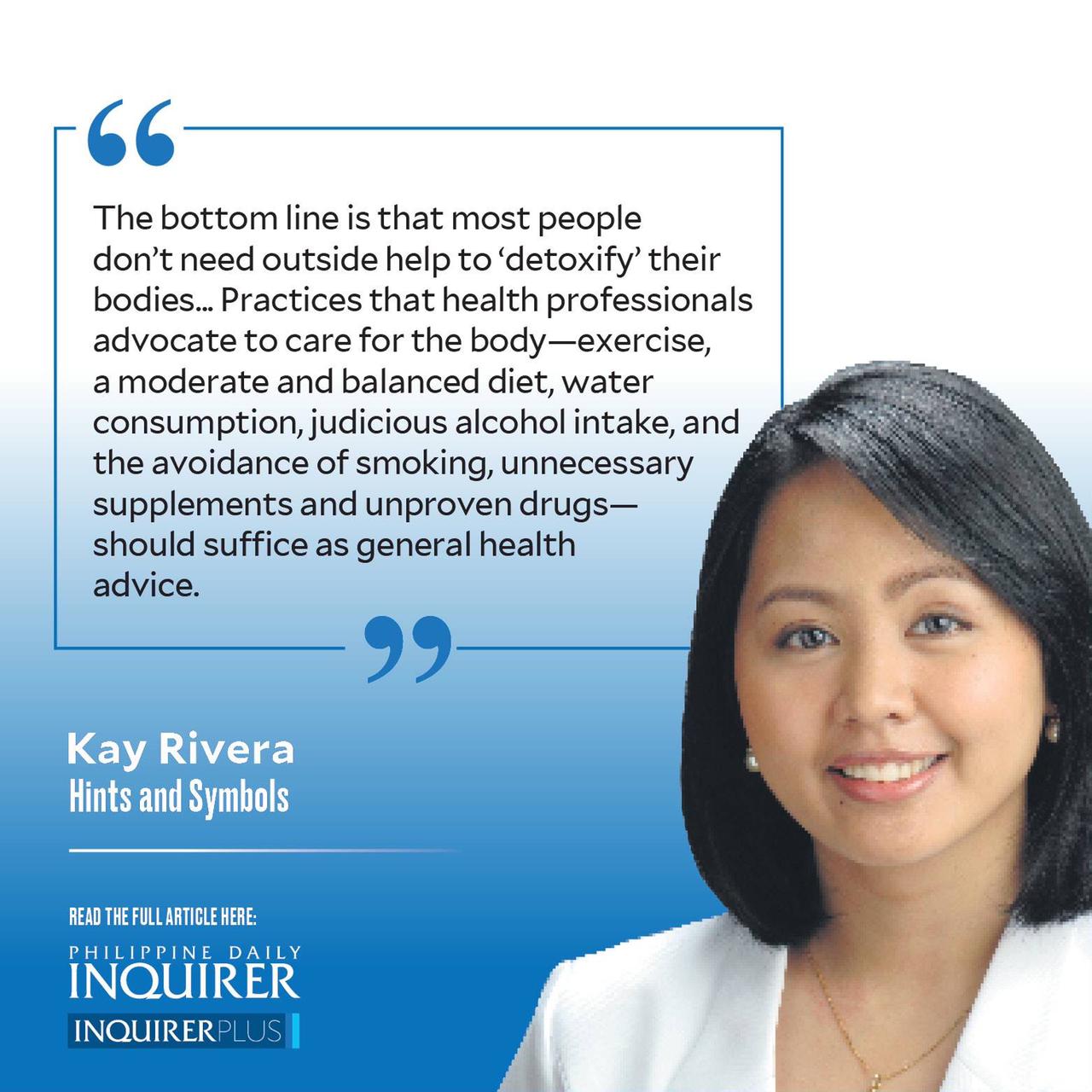The detox trap
Last week, Korina Sanchez made a Facebook post extolling the virtues of extracorporeal blood oxygenation and ozonation (EBOO). Her post, which showed photos of her receiving the treatment, marveled at how one could see the “toxins” leaving the body and encouraged using the treatment for preventive health. She appears to have undergone the treatment for a segment of her television show, which explains the benefits of “purifying” the blood à la hemodialysis, filtering out “toxins” and “infectious particles.” Sanchez ends the segment by saying “clean your blood today!”
The response from health professionals has been quick, and rightly so, lest titbits of misinformation in said Facebook post cause harm to Filipinos looking for ways to avoid getting sick. EBOO, through which blood is passed through a machine, oxygenated, then returned to the body, has been studied clinically, with relatively limited data and small sample sizes, for use in such conditions as peripheral arterial disease. With small samples, such studies are inevitably underpowered and regulating bodies will often require stronger evidence of safety and effectiveness before approving such therapies. Moreover, the evidence to support the treatment’s use in healthy individuals, purely to “prevent illness,” is quite thin. Finally, for healthy persons, “detoxification” is a process accomplished by the kidneys, liver, intestines and immune system — at absolutely no cost, and with no need for external machines. (For those with kidney or liver dysfunction, treatments should be appropriate and supervised.) Sanchez describes also how the venous blood passed into the machine became clearer and brighter afterwards. However, venous, or deoxygenated, blood is by nature darker; and arterial, or oxygenated, blood is bright red. “Toxins” don’t come into play at all.
Words such as “toxins” and “cleanses” have evolved as part of the worldwide scam that is “detoxing.” Originally detoxification meant the legitimate treatment of such conditions as poisoning or addiction. Now wellness and lifestyle brands use the term to mean mostly do-it-yourself practices for the removal of unspecified “impurities” from the system, supposedly rectifying the wrongs caused by overindulgence or unhealthy lifestyles. Colon cleanses, detoxifying diets, nasal irrigation, tinctures, cleansing teas, and so on, are part of a large industry that capitalizes on the desire for quick and simple health remedies, tricking people to think that they need to go to such measures to do a “spring cleaning” of the body. Such practices have repeatedly been criticized for lack of sound evidence of efficacy but continue to thrive. They may also cause harm: detox diets can deprive the body of essential macronutrients; intravenous treatments come with risks of emboli and bloodborne infections; and products claiming to cleanse the liver or kidneys may even be harmful, straining the organs they claim to protect.
In the Philippines, such practices are undoubtedly dangerous. They contribute to medical misinformation where health education is already weak. They make nebulous and baseless “purification” treatments attractive, often in contrast to sound health advice. For instance, since Sanchez’s post mentioned that EBOO can also filter out viruses, I have seen social media posts touting the treatment as an alternative to vaccine inoculation against, or as a treatment to prevent, COVID-19 infection. It’s also an easy way to cheat the gullible out of their money, specially now when Filipinos are particularly worried about their health, while slogging through a pandemic, dealing with widespread hunger and unemployment.
The bottom line is that most people don’t need outside help to “detoxify” their bodies or, as Sanchez says, to “clean” their blood. Practices that health professionals advocate to care for the body—exercise, a moderate and balanced diet, water consumption, judicious alcohol intake, and the avoidance of smoking, unnecessary supplements and unproven drugs—should suffice as general health advice. These interventions cost far less and are safer than the treatments advocated by “detox” proponents. Readers should take care to sort fact from fiction and to seek health advice from legitimate resources; influencers and media practitioners should also be responsible enough to seek more sources of information before talking about a health intervention.
kchuarivera@gmail.com

















